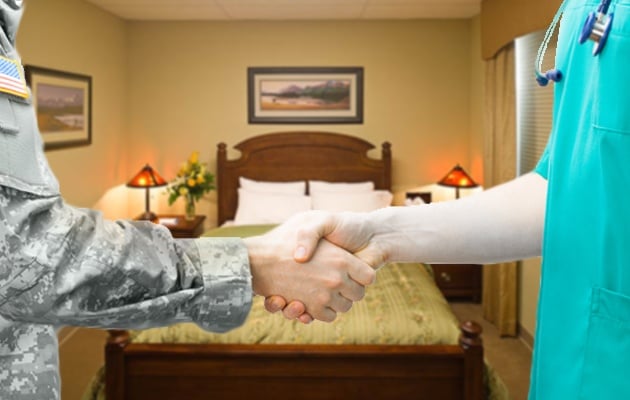
Post-Traumatic Stress Disorder (PTSD) is a serious condition affecting many military personnel and veterans. While the emotional and psychological effects of PTSD are often discussed, sleep disturbances are one of the most significant challenges.
The inability to achieve quality rest further exacerbates the condition, perpetuating a cycle of anxiety, irritability, and exhaustion. However, the impact of PTSD on sleep isn’t limited to those diagnosed.
During this National Veterans and Military Families Month, family members, particularly spouses and children, can also be affected when a loved one experiences sleep issues due to PTSD. Here’s a look at how to improve sleep quality for both PTSD sufferers and their families, along with how loved ones can support the process.
Understanding Sleep Disruptions Caused by PTSD
Sleep issues are a hallmark of PTSD, often stemming from hyperarousal, nightmares, and intrusive thoughts. Hyperarousal is a state where the nervous system remains on high alert, making it difficult for someone to fall or stay asleep. Nightmares and flashbacks often intrude during sleep, leading to frequent waking and insomnia.
For military personnel, especially those who have experienced combat, certain stimuli like loud noises or sudden movements during sleep may trigger responses associated with traumatic events. This cycle of poor sleep perpetuates PTSD symptoms, increasing feelings of anxiety, depression, and irritability during the day.
Improving sleep quality involves addressing both the physical and emotional components of PTSD. Cognitive Behavioral Therapy for Insomnia (CBT-I) has been shown to be effective for PTSD patients struggling with sleep. This form of therapy teaches individuals to manage their thoughts and beliefs about sleep, promoting healthier sleep patterns.
How Family and Friends Can Support Better Sleep
Spouses, partners, and family members play a crucial role in supporting someone with PTSD. Often, families of veterans or active military personnel experience what is known as “secondary PTSD,” where the emotional stress of living with someone with PTSD begins to impact their own mental health. This can lead to tension and frustration within relationships, making sleep disturbances more widespread.
For spouses, one of the most important things is to foster a calming bedtime routine. This might include reducing stimuli in the bedroom such as loud noises, bright lights, or electronics, all of which can interfere with sleep. Encouraging relaxation techniques, such as meditation or deep-breathing exercises, can help the PTSD sufferer ease into sleep.
Children of military personnel with PTSD may also be impacted, especially if the family dynamic is strained due to poor sleep. Keeping a consistent family routine, and encouraging open communication about feelings, can help mitigate some of the stress that children may feel. It’s also important for family members to encourage professional support. The Department of Veterans Affairs (VA) offers family therapy to help navigate these challenges.
Establishing Healthy Sleep Habits
For those living with PTSD, establishing healthy sleep habits, or sleep hygiene, can significantly improve sleep quality. Sleep hygiene involves creating an environment conducive to sleep and establishing routines that signal the body that it’s time to wind down.
Here are some tips:
- Create a sleep-conducive environment: Keep the bedroom dark, cool, and quiet. Consider using blackout curtains or white noise machines.
- Stick to a sleep schedule: Going to bed and waking up at the same time every day helps regulate the body’s internal clock.
- Limit caffeine and alcohol: Both substances can interfere with sleep. Avoid consuming them in the evening.
- Wind down with relaxation techniques: Practices such as progressive muscle relaxation or mindfulness meditation can help signal the brain that it’s time to sleep.
If nightmares are a significant issue, Image Rehearsal Therapy (IRT) can be particularly helpful. IRT involves working with a therapist to rewrite recurring nightmares and reduce their frequency.
The Importance of Support Networks
It’s vital for military personnel and veterans with PTSD to know they’re not alone. Families and friends can be a source of comfort and stability, particularly when it comes to sleep. Whether by helping establish a nightly routine, encouraging treatment, or seeking professional help themselves, loved ones have a critical role to play in the healing process.
For those living with PTSD, reaching out for professional help is the first step to improving not just sleep, but overall mental health. Quality sleep is essential for managing PTSD, and with the right support, military personnel, veterans, and their families can reclaim restful nights and improved well-being.
By understanding the effects of PTSD on sleep, adopting healthy sleep habits, and seeking support, individuals can begin the journey toward better sleep and a better life. Connect with Veteran-owned Alaska Sleep Clinic for your free consultation to help participate in your sleep journey.








